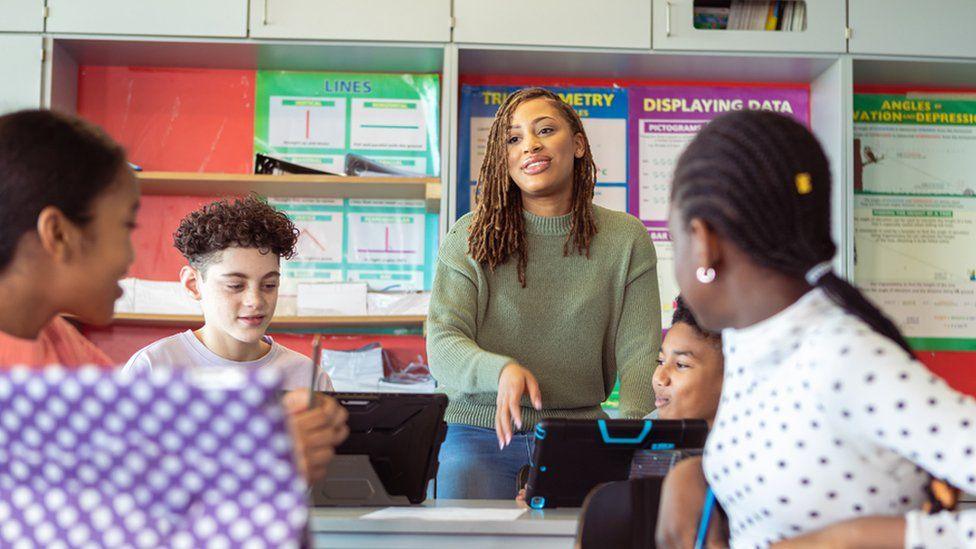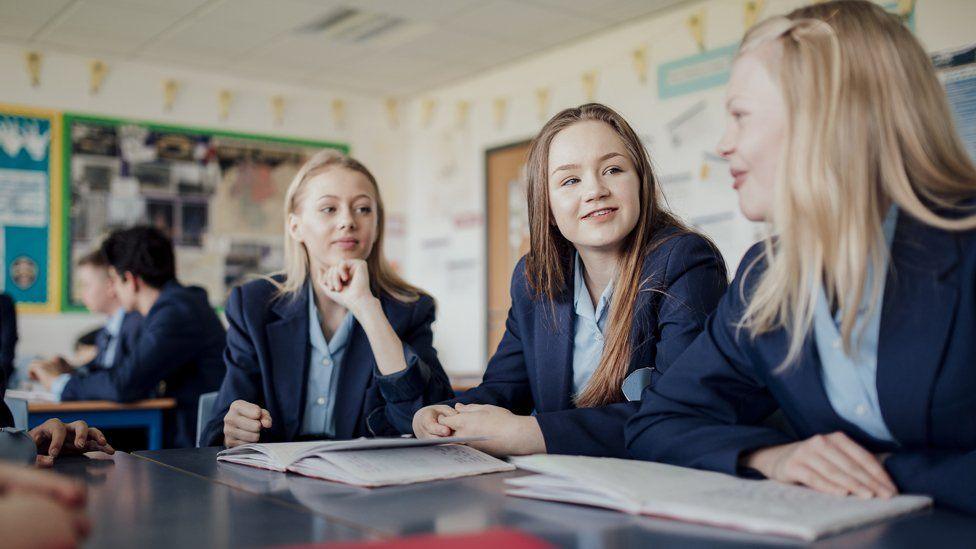What do children learn in sex education?

- Published
Schools in England should teach children how to recognise and act against misogyny - prejudice against women - under new government guidance around sex education classes.
But plans to impose age limits on certain subject areas, proposed by the previous Conservative government just before last year's election, will not go ahead.
How is sex education taught in schools?
Sex education is part of RSHE, which stands for relationships, sex and health education.
It is mandatory for RSHE to be taught in all secondary schools in England.
Primary schools must cover relationships and health education, but can choose whether or not to cover sex education.
The religious background of all pupils must be taken into account, to ensure that topics are appropriately handled.
Why is RSHE controversial?
One of the biggest issues is whether schools overstep boundaries and whether lessons are age-appropriate.
There were protests across England in 2019, after the government said teaching about relationships and LGBT equality would become compulsory.
In 2023, protesters outside a school in Manchester said children were being sexualised, and called for LGBT material to be withdrawn.
Former Conservative prime minister, Rishi Sunak, brought forward a planned review of RSHE guidance but head teacher unions said they were "deeply concerned".
Draft guidance, published just before the 2024 election, suggested sex education should not be taught before Year 5, while topics like sexual harassment and pornography should not be taught before Year 7.
But in July 2025, the new Labour government released the final guidance, which outlined areas that should be introduced in primary school and what students should know by the end of secondary school - without assigning specific ages to individual topics.
What does the new RSHE guidance say?
The guidance requires primary schools to teach respectful relationships, boundaries and the risks of sharing information and images online.
It recommends that conception, birth and puberty is taught in Year 5 or Year 6 - but this will not be compulsory.
Primary school teachers may also choose to discuss the sharing of naked images or online sexual content if it is affecting their pupils, or if they know that students have seen pornography.
By the end of secondary school, students should be taught how to keep themselves and others safe, including how to avoid sexually transmitted infections and unplanned pregnancies.
Additions in the secondary school curriculum include lessons on:
The sexual norms endorsed by so-called "involuntary celibates" (incels) or online influencers
AI-generated sexual imagery and deepfakes
How pornography links to misogyny
Sexual ethics beyond consent and the awareness of power dynamics
It says secondary-school pupils will learn about protected characteristics, such as sexual orientation and gender reassignment. But schools should not teach as fact that all people have a gender identity.
The new guidance, which schools will begin implementing this autumn, will come into full legal force from September 2026.
What are children currently taught in RSHE?
Throughout primary school, children are taught about healthy, respectful relationships, focusing on family and friendships - including online and social media.
Children also learn about physical health, parts of the body, boundaries and puberty.
The government strongly encourages schools to include teaching about different types of family and same-sex relationships.
At secondary school, relationships and sex education covers content on a wider range of key topics.
This includes sex, sexual relationships, consent, online abuse, domestic abuse and female genital mutilation (FGM).
Can parents see what's taught in RSHE?
Yes. The 2025 guidance says schools should "proactively" engage with parents to ensure they are aware of what is being taught.
Parents have the right to view all of their school's RSHE curriculum material and every school must publish its policy on its website and let parents know if there are any changes to this.

Can parents remove their child from RSHE classes?
In some cases, yes.
Parents have a right to remove their child from some sex education lessons, but not from relationships education.
They can speak to the school about concerns, but do not have a right to change parts of the curriculum with which they disagree.
Students can choose to opt back in from three terms before they turn 16.
How is RSHE and RSE taught in Northern Ireland, Wales and Scotland?
Northern Ireland
Relationships and sexuality education (RSE) is mandatory for all pupils. Each school develops its own RSE policy in line with the school's ethos.
In secondary schools, a parent can remove a pupil from sessions covering sexual health and the prevention of early pregnancy and access to abortion.
Other RSE lessons are mandatory.
Wales
RSE has been a mandatory part of the curriculum since 2022.
Guidance to schools sets out which "developmentally-appropriate" topics should be covered from age three to 16.
A legal challenge to RSE by a group of parents was rejected in the High Court in 2022.
Scotland
Local authorities are responsible for the delivery of relationships, sexual health and parenthood (RSHP) education in schools.
Parents and carers are allowed to view key teaching materials, and can withdraw their children from the sexual health elements of RSHP education.
The Scottish government is in the process of finalising updated guidance, after a public consultation in 2023.